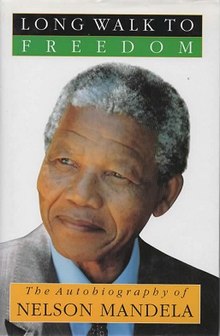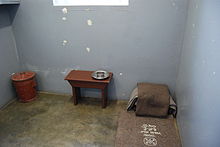Pollsmoor Prison, officially known as Pollsmoor Maximum Security Prison, is located in the Cape Town suburb of Tokai in South Africa. Pollsmoor is a maximum security penal facility that continues to hold some of South Africa's most dangerous criminals. Although the prison was designed with a maximum capacity of 4,336 offenders attended by a staff of 1,278, the current inmate population is over 7,000.
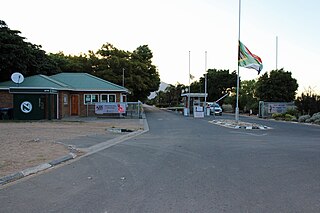
Drakenstein Correctional Centre is a low-security prison between Paarl and Franschhoek, on the R301 road 5 km from the R45 Huguenot Road, in the valley of the Dwars River in the Western Cape of South Africa. The prison is the location where Nelson Mandela spent the last part of his imprisonment for campaigning against apartheid.
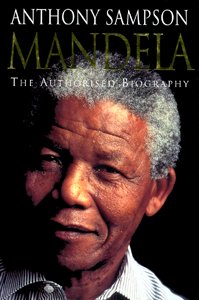
Mandela: The Authorised Biography is a study of Nelson Mandela, the former President of South Africa, by the British journalist Anthony Sampson.
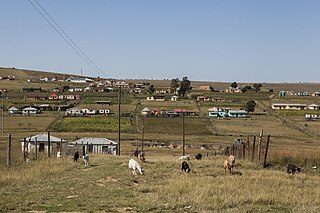
Qunu is a Xhosa rural village in South Africa's Eastern Cape Province, 32 km (20 mi) south-west of Mthatha on the N2 national route.

Goodbye Bafana, or The Color of Freedom (US), is a 2007 drama film, directed by Bille August, about the relationship between Nelson Mandela and James Gregory, his censor officer and prison guard, based on Gregory's book Goodbye Bafana: Nelson Mandela, My Prisoner, My Friend. The film also explores the relationship of James Gregory and his wife as their life changes while Mandela is under Gregory's watch.
Nelson Mandela (1918−2013) was an anti-apartheid activist and former president of South Africa.
The Little Rivonia Trial was a South African apartheid-era court case in which several members of the armed resistance organization Umkhonto we Sizwe faced charges of sabotage. The accused were: Laloo Chiba, Dave Kitson, Mac Maharaj, John Matthews and Wilton Mkwayi. A confederate of theirs, Lionel Gay turned state witness, and in return, the prosecution dropped the charges against him.
There is a wide range of ways in which people have represented apartheid in popular culture. During (1948–1994) and following the apartheid era in South Africa, apartheid has been referenced in many books, films, and other forms of art and literature.
James Gregory was the censor officer and prison guard of Nelson Mandela for many years of his captivity. He later wrote the book Goodbye Bafana: Nelson Mandela, My Prisoner, My Friend, on which the 2007 film Goodbye Bafana was based. The book, and later the film, are based on the idea that Gregory and Mandela had developed a friendship despite being prison guard and prisoner, respectively.

Nelson Rolihlahla Mandela was a South African anti-apartheid activist and politician who served as the first president of South Africa from 1994 to 1999. He was the country's first black head of state and the first elected in a fully representative democratic election. His government focused on dismantling the legacy of apartheid by fostering racial reconciliation. Ideologically an African nationalist and socialist, he served as the president of the African National Congress (ANC) party from 1991 to 1997.
James Kantor was a South African lawyer and writer.
Mandla Langa is a South African poet, short-story writer, novelist, and cultural activist. He grew up in the KwaMashu township of Kwazulu Natal. His novel The Lost Colours of the Chameleon won the 2009 Commonwealth Writers' Prize . Langa enrolled for a degree in English and Philosophy at the University of Fort Hare, but was expelled in 1973 as a result of his involvement in the activities of the South African Student Organisation. In 1976, he went into exile and has lived in different countries of Southern Africa as well as in Hungary and the United Kingdom.

Mandela: Long Walk to Freedom is a 2013 biographical film directed by Justin Chadwick from a script written by William Nicholson and starring Idris Elba and Naomie Harris. The film is based on the 1994 autobiographical book Long Walk to Freedom by anti-apartheid revolutionary and former South African President Nelson Mandela.
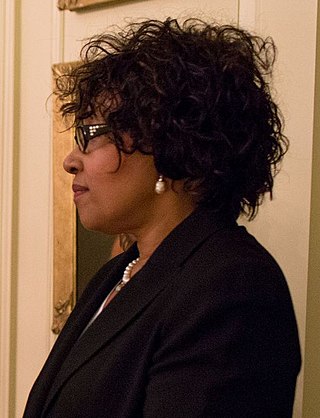
Princess Zenani Mandela-Dlamini is a South African diplomat and traditional aristocrat. She is the sister-in-law of the King of eSwatini, Mswati III, and the daughter of Nelson Mandela and his former wife, Winnie Mandela.
"I Am Prepared to Die" was a three-hour speech given by Nelson Mandela on 20 April 1964 from the dock at the Rivonia Trial. The speech is so titled because it ended with the words "it is an ideal for which I am prepared to die". It is considered one of the great speeches of the 20th century, and a key moment in the history of South African democracy.
I have cherished the ideal of a democratic and free society in which all persons live together in harmony and with equal opportunities. It is an ideal for which I hope to live for and to see realised. But my lord, if it needs be, it is an ideal for which I am prepared to die.
Colours of a New Day: Writing for South Africa is an anthology first published in 1990, edited by Sarah LeFanu and Stephen Hayward, inspired by an international tribute concert to imprisoned anti-apartheid revolutionary Nelson Mandela on his 70th birthday in 1988. As described by The New Internationalist magazine: "This is the literary equivalent of the Free Mandela concert: a collection of prose and poetry by 34 writers from around the world who have pledged their profits to an ANC cultural project inside South Africa." Taking the title from an optimistic phrase used by a character in Lewis Nkosi's story "Under the Shadow of the Guns", the editors aimed to publish a book that would give writers the opportunity to express their opposition to apartheid and also to provide material assistance for the cultural work of the African National Congress (ANC), to which the writers' royalties and publishers' profits were donated.

Dare Not Linger: The Presidential Years is a book by Nelson Mandela and Mandla Langa describing Mandela's term as President of South Africa. It was published in 2017, four years after Mandela's death, and is based on an unfinished memoir that Mandela had worked on after his term as president, as well as archive material and interviews, and has a prologue by Graça Machel. The book's title comes from the closing sentence of Mandela's previous autobiography Long Walk to Freedom: "But I can only rest for a moment, for with freedom come responsibilities, and I dare not linger, for my long walk is not yet ended."
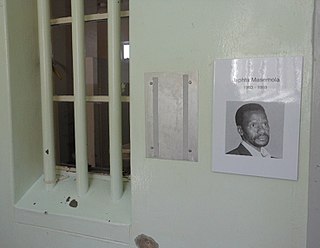
Jafta Kgalabi Masemola OLS, also known as The Tiger of Azania and Bra Jeff, was a South African anti-apartheid activist, teacher, and founder of the armed wing of the Pan Africanist Congress (PAC). He spent 27 years in South African prison during the apartheid era in South Africa, and was released in October 1989, shortly before the legalization of the PAC and the African National Congress by F. W. de Klerk. He served the longest sentence of any political prisoner in Robben Island prison in South Africa.

Geoff Blackwell is a New Zealand publisher, author and film director, the co-founder of Blackwell & Ruth, and founder of MILK Tailormade Books. He has created books, exhibitions and films on subjects of humanity, equality and the environment. He is the creator and director of the Netflix original series Live to Lead, which was created in partnership with the Nelson Mandela Foundation.
The Mandela family is a South African political dynasty and chiefly family. Its most prominent member was Nelson Mandela, who served as President of South Africa from 1994 to 1999.
